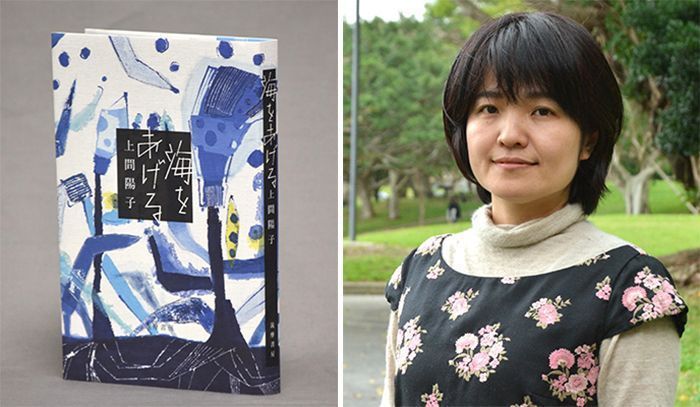Umi wo Ageru wins Japan Booksellers’ Award for Nonfiction, Author Yoko Uema speaks of Okinawan challenges and hopes

November 11, 2021 Ryukyu Shimpo
On November 10, the winner of the 2021 Japan Booksellers’ Award for Nonfiction, which is organized jointly by Yahoo News and Hontai, was announced. Bookstore clerks throughout Japan vote on the winner, and this year, chose University of the Ryukyus Professor Yoko Uema’s Umi wo Ageru (published by Chikuma Shobo).
Uema spoke at the award ceremony held in Tokyo. “I believe that this award is not for me, but for Okinawa, and that it is an expression of well-wishes to children who experience hardship living in Okinawa,” she said.
Umi wo Ageru is Uema’s first collection of personal essays and in them, she has written about life with her family and young daughter, and feelings she has experienced over the course of her continuing work researching and supporting teen mothers. The essays also address problems that permeate daily life in Okinawa such as the issue of the military bases, and the mistreatment of the islands by the government and authorities.
In her speech, Uema spoke of the day that, newly a teenager, she was told by her mother to hold her keys in her hand when she went out. She continued, “After coming to Tokyo, I learned that I didn’t need to walk with my keys in my hands, even at night. But now, I’m raising a daughter, and so this has become a very real concern for me again.” Uema also talked about her essay “Ariel no Okoku” (Ariel’s Kingdom), in which she writes about the day that soil was poured into the sea at Henoko for construction of the new U.S. military base.
“You could say that Umi wo Ageru was written because of ‘Ariel no Okoku.’ When I compiled the book, I thought only of one thing: how could I make people in Tokyo and the rest of Japan understand the pain of living in this Okinawa with my little girl?” she said. “I wanted to write about how, no matter how much we try, the government’s actions always show us that it doesn’t matter. When I wrote ‘Ariel no Okoku,’ I put in a lot of work so that when you read it, you will feel that the problem is your own. And a lot of people in different places brought their expertise to, and put a lot of work into this book as well. I think they were hoping to bring the book this kind of attention.”
Okinawa continues to experience problems caused by the presence of the military bases. Uema ended her 15-minute speech saying, “Our islands are so small that they can be hard to find on a map, but problems that Japan wants to be both out of sight and out of mind are pushed onto us. Umi wo Ageru is Pandora’s Box in which I’ve written about our country’s Achilles heel. And today, that book is in the spotlight. Pandora’s box has been opened, and the only thing left is one hope: that we don’t give up on justice, fairness, and the future that we want for our children.”
(English translation by T&CT and Ellen Huntley)
Previous Article:15-year-old Okinawan Shuri Araki wins third place overall at international standup paddle board competition, marking a breakout performance for the young competitor
Next Article:Miyakojima residents voice sense of danger, call for the removal of missiles claiming they are an “obstacle to peace”
[Similar Articles]
- English tourist guidebook on Okinawa published
- Photographer Mao Ishikawa wins Lifetime Achievement Award
- Text of Governor Onaga’s UN speech opposing new base sent to 151 ambassadors and consuls in Japan
- Former Ryukyu Shimpo cameraman publishes book to commemorate Koza Riot
- Students appeal to the UN Council that concentrating U.S. bases in Okinawa is a violation of human rights
 Webcam(Kokusai Street)
Webcam(Kokusai Street)


